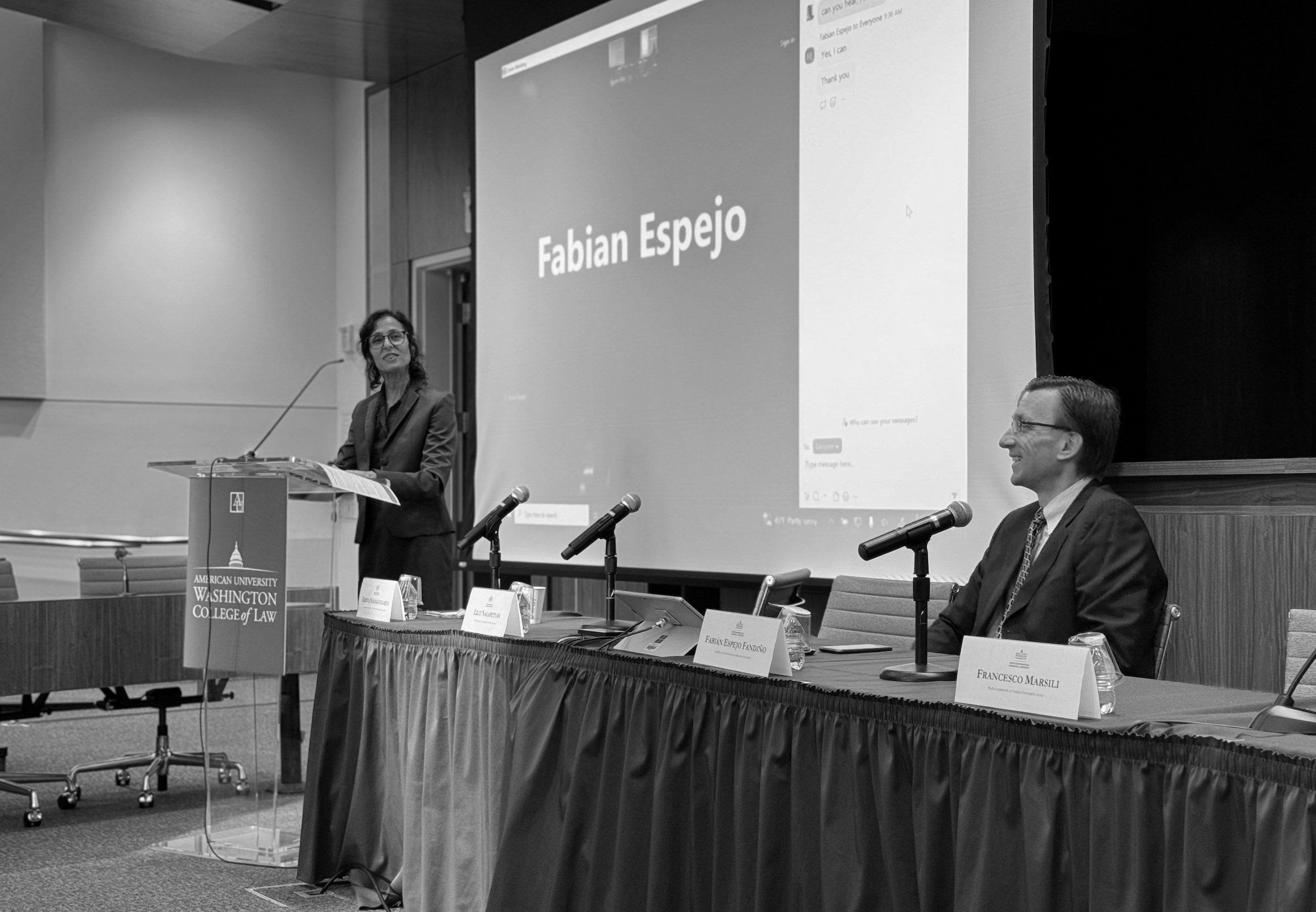October 3, 2024, Washington, DC
Panel: “Fair Chips: Addressing Human Rights Issues in the Semiconductor Industry and Supply Chain.”
The American University Washington College of Law recently hosted an insightful panel discussion titled “Fair Chips: Addressing Human Rights Issues in the Semiconductor Industry and Supply Chain.” The students, academics and professionals attended the event to discuss the multifaceted human rights challenges impacting this crucial global industry.
The discussion was structured into three comprehensive segments to provide attendees a thorough understanding of the topic:
1. Brief Background of the Semiconductor Industry and Its Supply Chain:
This segment laid the foundation by exploring the complex nature of the semiconductor industry, a cornerstone of modern technology. Panelists discussed the intricacies of its supply chain, highlighting how these components are manufactured and distributed worldwide.
2. Worldwide Cases on Human Rights Issues in the Industry:
The second part featured case studies and real-world examples of human rights issues prevalent across different regions. Key discussion points included environmental concerns, employment rights violations, adverse health impacts on workers, and existing challenges within regulatory frameworks.
3. Regulatory Framework and Corporate Responsibility for Human Rights Issues:
In the final segment, the panel addressed the regulatory measures and corporate social responsibility (CSR) initiatives necessary to tackle these issues. The panelist Shalala Valiyeva shared insights into how companies and governments can work together to enforce regulations and promote ethical practices within the industry.
The panel discussion highlighted the urgent need for collaborative efforts to ensure that the semiconductor industry progresses in a way that respects human rights and promotes sustainability. Attendees left with a deeper understanding of both the challenges and potential solutions to foster a more equitable industry.
November 15 -16, 2023, Washington, DC
VII Symposium on Salient Issues in International Arbitration - International Arbitration: Evolution or Devolution?
At VII Symposium on Salient Issues in International Arbitration - International Arbitration: Evolution or Devolution? A boon for investors in the dynamic oil and gas sector we explored the Astana International Financial Centre (AIFC) Court's Exclusive Jurisdiction, emphasizing its pivotal role in supporting arbitration awards enforcement within Kazakhstan.
Even though Kazakhstan is a party of the New York Convention and local legislation supports to enforce the arbitration awards, the AIFC Court has an exclusive jurisdiction over the enforcement of the arbitration decisions the AIFC Court is an independent court composed of judges with common law experience. This opportunity for investors in the oil and gas industry might be useful when it comes to the enforcement action of an Award on the territory of Kazakhstan.
In my observation, a potential concern arises regarding how to enforce AIFC Court decisions in foreign countries that have international treaties and agreements with Kazakhstan.
For example, the Court of Dubai International Financial Center also faced obstacles like enforcing its decisions outside of the UAE. As a solution to this issue the DIFC Court chose a policy to sign a memorandum with other countries' courts. The policy of concluding memorandums and protocols with extraterritorial courts will be a tool to solve the problem in enforcement and request to enforce the AIFC decisions overseas.organized by the Center on International Commercial Arbitration.
October 19, 2023
Exploring Trade and the Semiconductor Industry
Semiconductors are becoming increasingly critical to every part of economic activity. Investment in the semiconductor industry is not about capturing the share of a shrinking pie. It is about guaranteeing sufficient capacity to meet the demands of a swiftly expanding global market.
Three implications are important to discuss in a semiconductor strategy:
1. Diplomatic implication — exploring how semiconductor technology, production, and supply chains can be strategically leveraged for diplomatic purposes, influencing geopolitics and international relations.
2. Policy implication — assessing the competitive advantages resulting from government and economic policies. For example, an emphasis on strengthening the semiconductor industry holistically through fundamental research and the practical application of R&D innovations, rather than just focusing on manufacturing capacity.
3. Legal implication — highlighting the necessity of effective regulations to protect economic security and uphold intellectual property rights in the semiconductor domain both domestically and internationally.
When the countries specialize based on comparative advantage, they are still dependent on each other for access to a wide range of desirable goods. The United States controls on semiconductor exports are hardly new, but assuming a more significant leadership role in this area will require the United States to be even more protective of unauthorized exports of controlled technologies.
The Chip and Science Act of 2022 is the law by which semiconductor companies evaluate how to support chip manufacturing. This is a large-scale public investment in private industry, which has no precedent in recent times. The line between industrial policy and a market driven semiconductor industry needs to promote the supply chain resilience without disrupting unduly semiconductor ecosystem that has been a vital innovation.
460 companies worldwide have announced $166 billion in investments in semiconductors and electronics in one year from since the CHIPS and Science Act was signed. The Department of Commerce has been closely communicating with various partners and allies of the United States like South Korea, Japan, the United Kingdom, India, and the European Union as they implement CHIPS.







